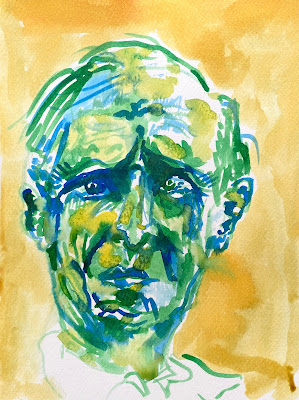Words, images and documents by or collected by Jessica Schouela
Sunday 28 May 2023
Saturday 27 May 2023
Saturday 20 May 2023
Deborah Levy, August Blue
It was an immense treat and privilege to see Deborah Levy talk about her new novel August Blue a couple of weeks ago at Tobacco Factory. Being in her presence and witnessing her mind work in real time—the tangents she permits herself or doesn't know she's doing or perhaps she just accepts her flowing musings and does not try to stifle them—makes me feel like a teenager again, discovering my first favourite writers and certain 20th century novels. Milan Kundera and Gabriel Garcia Marquez come to mind.
Deborah Levy's novels—and August Blue is no exception—are often journeys of the Europhile, and this love for countries in close proximity with diverse histories, cultures and language reflect the flanneuse pace of life, one which appeals tremendously but also feels somehow less and less possible as we plunge deeper in the 21st century, the world (technology and the possibility to be fully present somewhere and not know about elsewhere in real time) and politics (Brexit, etc) changed.
Flanneuse living is also one of luxury and privilege and I suppose this hit me harder reading August Blue in a way that was more jarring than other instances of reading. Perhaps this is because I am close in age to the narrator-protagonist, Elsa M. Anderson, who is 34, and Deborah Levy, who is not 34, made her character in some ways seem not 34 either, perhaps by accident or perhaps intentionally – the novel explores the theme of the double so there are multiple instances of what I am what I am not what I may be. Yet, there was something of a 20th century and older voice in Elsa that didn't quite seem to fit. Sometimes this was in the quality of observations of those around her or of certain word choices ("cancelling" or "Queen") that disrupted my immersion. Perhaps I felt these not to be the thoughts or actions of someone my age – at one moment, without much thought, Elsa hands a 50 euro note alongside her wet bathing suit to a homeless man in Paris when she cannot find smaller change.
The issue of money overtly hangs over the novel towards the end as her teacher/adoptive father Arthur Goldstein is on his death bed and questions of his estate are aired by his long term, but until recently, hidden lover. Less addressed is the monetary cost of the flanneuse lifestyle – while Elsa has royalties as part of her income and some savings, not working is, of course, not free and neither is travelling and living in multiple places, presumably paying simultaneous rents and/or for hotel rooms in London, Paris, and Athens, even if a couple nights of her accommodation is paid for by the parents of the students she gives two or three lessons to as part of her travels. And if for Elsa, it is affordable, and she can also make use of financial help from Arthur, then I suppose I am wondering about how, as a reader, taking in the extravagance, which is unrelatable and unachievable for most, made me feel.
It is possible that this disruption for me comes from a place of envy as I find myself five years or so into full time employment since my PhD came to an end, and perhaps as a result of doing the PhD in the first place, my capacity to travel spontaneously was extended beyond what most people can hope to access. It has become evident since joining the world of work and indeed, like most, needing to work to live, that the capacity to live in multiple places and not work is not only impaired, but will continue become more and more challenging as more roots take firmer holds. For some people, this luxury has and will always be an impossibility. While it may be that Elsa's life does resemble how artists or child free or single people might live (or perhaps even retired people), especially those without a 9 to 5, there was something romantically 20th century about the leisurely city hopping and having no other place to be, that somehow feels of another moment (especially in the pandemic, when the novel is set). Spending time in the world of August Blue felt simultaneously indulgent and pleasurable, but also disconcerting – I suppose either way, this may be in line with the double, the being and feeling both at once.
Subscribe to:
Posts (Atom)








